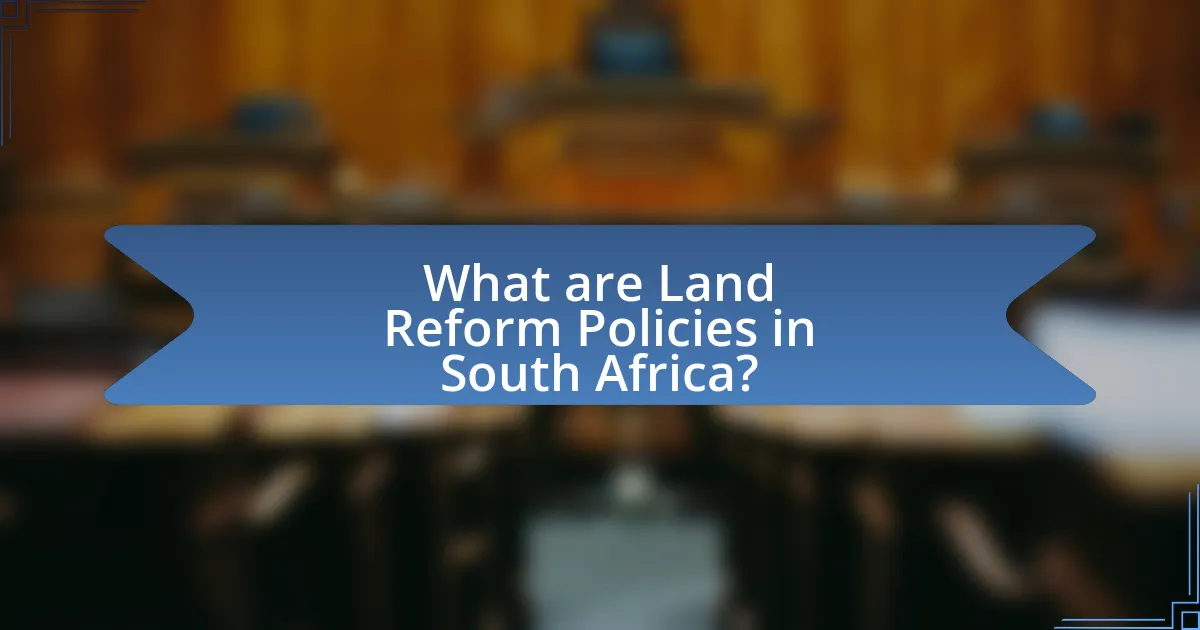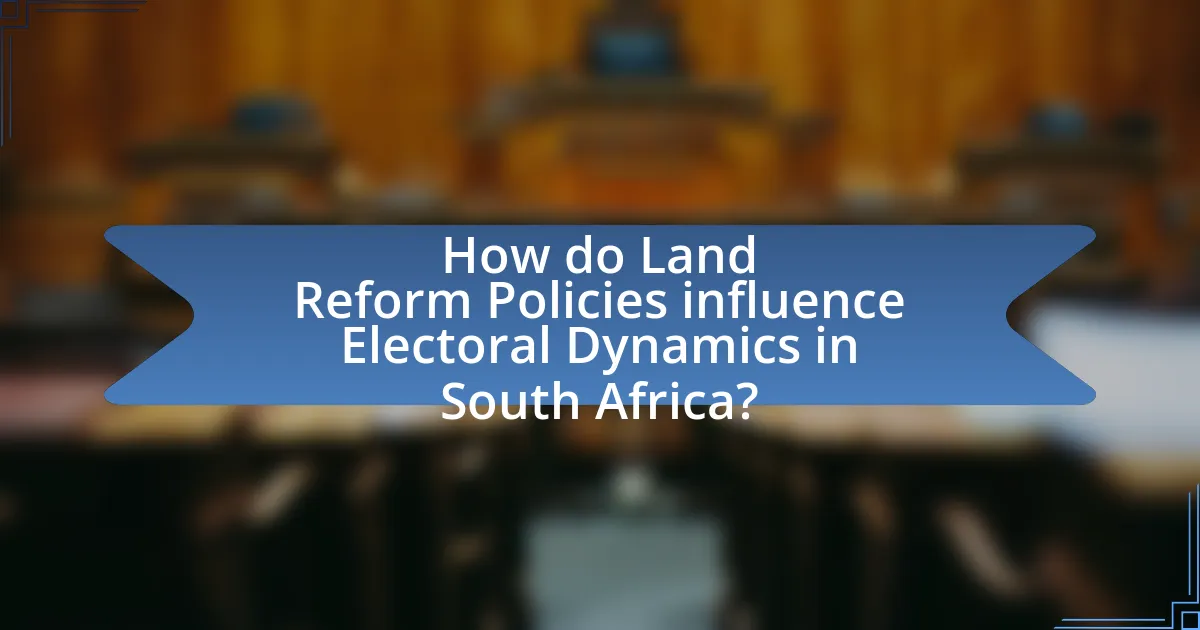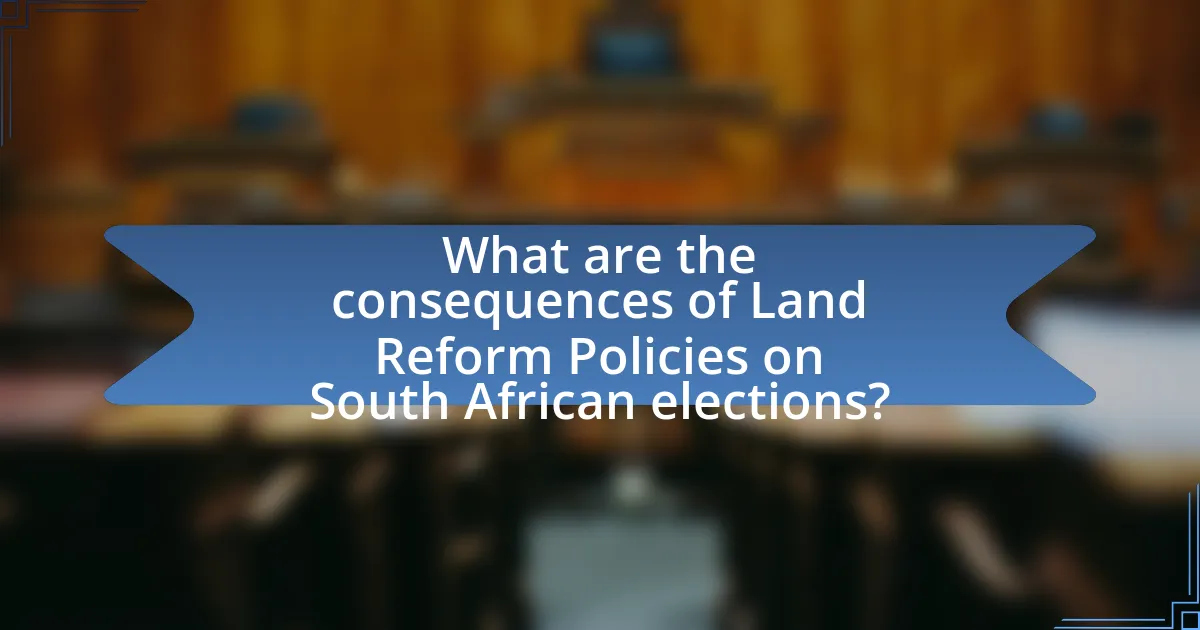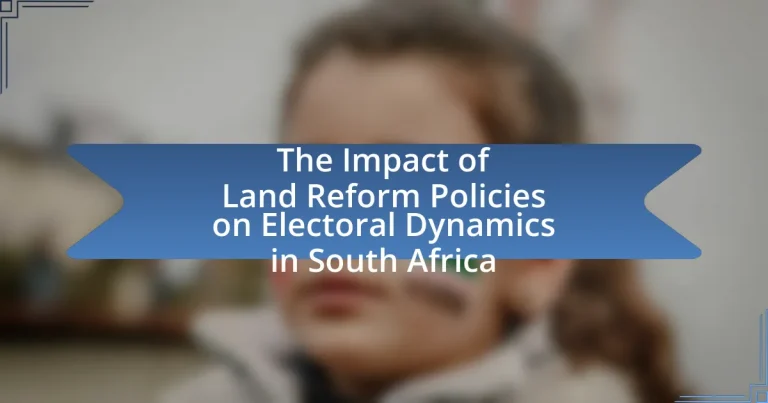The article examines the impact of land reform policies on electoral dynamics in South Africa, focusing on government initiatives aimed at addressing historical injustices related to land ownership and distribution, particularly the legacy of apartheid. It outlines the types of land reform policies, including land restitution, redistribution, and tenure reform, and discusses how these policies influence voter behavior, party support, and electoral outcomes. Additionally, the article highlights the challenges and implications of land reform for governance and policy-making, as well as best practices to enhance the effectiveness of these policies in the electoral context.

What are Land Reform Policies in South Africa?
Land reform policies in South Africa are government initiatives aimed at addressing historical injustices related to land ownership and distribution, particularly the legacy of apartheid. These policies seek to redistribute land to previously disadvantaged communities, promote equitable access to land, and enhance agricultural productivity. The South African government has implemented various programs, such as the Land Restitution Act of 1994, which allows individuals and communities to claim back land lost due to discriminatory laws, and the Land Reform (Labour Tenants) Act of 1996, which protects the rights of labor tenants. As of 2021, approximately 4.5 million hectares of land have been redistributed, reflecting the ongoing efforts to rectify past inequalities.
How do Land Reform Policies aim to address historical injustices?
Land reform policies aim to address historical injustices by redistributing land to marginalized communities that were dispossessed during colonial and apartheid eras in South Africa. These policies seek to rectify the inequities created by past land ownership patterns, which favored a minority while disenfranchising the majority. For instance, the South African government’s land reform program includes measures such as land restitution, where individuals or communities can reclaim land lost due to discriminatory laws, and land redistribution, which involves transferring land from large landholders to those without land. According to the South African Constitution, the government is mandated to promote equitable access to land, thereby acknowledging and attempting to rectify historical injustices related to land ownership.
What specific injustices are targeted by these policies?
The specific injustices targeted by land reform policies in South Africa include historical land dispossession, racial inequality in land ownership, and economic disenfranchisement of marginalized communities. These policies aim to rectify the injustices stemming from the apartheid era, where the majority of land was owned by a minority racial group, leading to systemic poverty and inequality among black South Africans. For instance, the 1913 Natives Land Act institutionalized racial segregation in land ownership, resulting in significant socio-economic disparities that land reform seeks to address.
How have these policies evolved over time?
Land reform policies in South Africa have evolved significantly since the end of apartheid in 1994. Initially, the focus was on restitution and redistribution, aiming to address historical injustices by returning land to dispossessed communities and providing land to the landless. Over time, these policies have shifted towards a more market-oriented approach, emphasizing partnerships with private sectors and promoting agricultural productivity. For instance, the 2018 amendment to the Constitution to allow expropriation without compensation reflects a growing urgency to accelerate land reform, driven by social and political pressures. This evolution is evidenced by the increasing involvement of various stakeholders, including civil society and international organizations, in shaping land reform discussions and policies.
What types of Land Reform Policies exist in South Africa?
In South Africa, the main types of land reform policies include land restitution, land redistribution, and land tenure reform. Land restitution aims to return land to individuals or communities dispossessed during apartheid, with the Restitution of Land Rights Act of 1994 serving as a legal framework. Land redistribution focuses on providing land to those who were previously denied access, often through government purchases or grants, to promote equitable land ownership. Land tenure reform seeks to secure land rights for those living on land without formal ownership, enhancing security and access to resources. These policies are designed to address historical injustices and promote social equity in land ownership.
What is the difference between redistribution and restitution policies?
Redistribution policies aim to alter the distribution of land and resources to achieve greater equity among the population, often through mechanisms like land reform or wealth redistribution. In contrast, restitution policies specifically focus on returning land or compensating individuals or communities who were dispossessed of their land due to historical injustices, such as apartheid in South Africa. The distinction lies in the intent and application: redistribution seeks to create a more equitable society overall, while restitution addresses specific historical grievances and aims to restore rights to those directly affected. This differentiation is crucial in understanding the broader implications of land reform policies on electoral dynamics in South Africa, where both types of policies can influence voter behavior and party support.
How do land tenure reforms fit into the broader land reform agenda?
Land tenure reforms are integral to the broader land reform agenda as they aim to secure property rights and improve access to land for marginalized communities. These reforms address historical injustices by redistributing land and ensuring that land ownership is equitable, which is essential for social stability and economic development. For instance, in South Africa, the land tenure reform process is designed to rectify the imbalances created by apartheid policies, thereby fostering a more inclusive society. This connection is evident in the South African government’s commitment to land reform, which includes initiatives like the Restitution of Land Rights Act and the Land Reform (Labour Tenants) Act, aimed at enhancing land security for previously disadvantaged groups.

How do Land Reform Policies influence Electoral Dynamics in South Africa?
Land reform policies significantly influence electoral dynamics in South Africa by shaping voter perceptions and party alignments. These policies, aimed at addressing historical injustices related to land ownership, often become central issues in electoral campaigns, impacting the strategies of political parties. For instance, the African National Congress (ANC) has utilized land reform as a key component of its platform to appeal to voters seeking redress for past inequalities, while opposition parties may leverage concerns about the effectiveness and implementation of these policies to gain support. The 2019 national elections highlighted this dynamic, where land reform discussions influenced voter turnout and party loyalty, reflecting the ongoing relevance of land issues in South African politics.
What role do Land Reform Policies play in shaping voter behavior?
Land reform policies significantly influence voter behavior by addressing issues of land ownership and economic inequality. These policies often mobilize voters who feel disenfranchised or marginalized, particularly in contexts where land ownership is tied to historical injustices, such as in South Africa. For instance, the 1994 democratic transition in South Africa saw land reform become a pivotal issue, as the African National Congress (ANC) leveraged land redistribution to gain support from black voters seeking redress for past injustices. Research indicates that areas with active land reform initiatives often experience increased political engagement and voter turnout, as communities rally around the promise of equitable land access. This correlation is evident in studies showing that constituencies benefiting from land reform are more likely to support parties advocating for these policies, thereby shaping electoral outcomes.
How do perceptions of land reform impact political party support?
Perceptions of land reform significantly influence political party support in South Africa, as they shape voter attitudes and party alignment. Positive perceptions of land reform can enhance support for parties advocating for equitable land distribution, while negative perceptions may lead to decreased support for those parties, as seen in the fluctuating electoral fortunes of the African National Congress (ANC) and the Economic Freedom Fighters (EFF). For instance, surveys indicate that voters who view land reform favorably are more likely to support parties that prioritize land redistribution, reflecting a direct correlation between land reform perceptions and electoral outcomes.
What demographic factors influence voter attitudes towards land reform?
Demographic factors that influence voter attitudes towards land reform include age, race, socioeconomic status, and education level. Younger voters tend to support land reform more than older generations, reflecting a desire for change and equity. Racial demographics play a significant role, as historically marginalized groups, particularly Black South Africans, often advocate for land redistribution to address past injustices. Socioeconomic status affects perspectives, with lower-income individuals more likely to favor land reform due to its potential to improve their living conditions. Education level also influences attitudes; those with higher education may have differing views on the effectiveness and implementation of land reform policies. These factors collectively shape the electoral dynamics surrounding land reform in South Africa, as evidenced by surveys indicating varying levels of support across different demographic groups.
How do political parties leverage Land Reform Policies in their campaigns?
Political parties leverage Land Reform Policies in their campaigns by emphasizing their commitment to addressing historical injustices and promoting equitable land distribution. For instance, parties like the African National Congress (ANC) highlight land reform as a means to empower marginalized communities and rectify past inequalities, which resonates with voters seeking social justice. Additionally, political parties often use land reform proposals to differentiate themselves from opponents, showcasing their plans for land redistribution as a key component of their platforms. This strategy is supported by public sentiment; surveys indicate that a significant portion of the South African electorate views land reform as a critical issue, influencing their voting decisions.
What strategies do parties use to appeal to land reform supporters?
Parties appeal to land reform supporters by advocating for equitable land distribution and emphasizing the historical injustices of land dispossession. They often propose specific policies aimed at redistributing land to previously marginalized communities, which resonates with voters who prioritize social justice and economic empowerment. For instance, the African National Congress (ANC) has promoted land expropriation without compensation as a key policy to address land inequality, reflecting a commitment to rectifying past wrongs. This strategy is supported by public sentiment; surveys indicate that a significant portion of the South African population views land reform as essential for achieving economic equity.
How do parties address opposition to land reform in their platforms?
Parties address opposition to land reform in their platforms by emphasizing the need for equitable land distribution and economic justice. For instance, the African National Congress (ANC) advocates for land reform as a means to rectify historical injustices and promote social cohesion, while the Economic Freedom Fighters (EFF) calls for expropriation of land without compensation to address systemic inequalities. These positions are often framed within the context of national development goals and the need to stimulate economic growth, as evidenced by the ANC’s commitment to land reform in its 2019 election manifesto, which highlights the importance of land as a critical asset for economic empowerment.

What are the consequences of Land Reform Policies on South African elections?
Land reform policies in South Africa significantly influence electoral dynamics by shaping voter sentiment and party alignment. These policies, aimed at redistributing land to address historical injustices, often become central issues in election campaigns, affecting the platforms of major political parties. For instance, the African National Congress (ANC) has historically advocated for land reform, which resonates with its base, while opposition parties may leverage concerns about economic stability and property rights to attract voters. The 2019 elections highlighted this dynamic, as land reform discussions intensified, leading to increased voter mobilization around these issues. Consequently, land reform policies can alter electoral outcomes by swaying public opinion and influencing party strategies, ultimately impacting the composition of the South African Parliament.
How have recent elections been affected by land reform debates?
Recent elections in South Africa have been significantly influenced by land reform debates, as these discussions resonate deeply with voters’ concerns about economic inequality and historical injustices. The African National Congress (ANC) has faced pressure to address land redistribution, which has become a pivotal issue in electoral campaigns, impacting voter sentiment and party support. For instance, the 2019 national elections saw the Economic Freedom Fighters (EFF) gaining traction by advocating for expropriation of land without compensation, reflecting a shift in public opinion towards more radical land reform measures. This shift has compelled traditional parties to adjust their platforms, demonstrating that land reform debates are not only shaping policy discussions but also altering the electoral landscape in South Africa.
What trends can be observed in voter turnout related to land reform issues?
Voter turnout related to land reform issues in South Africa shows a significant correlation between land reform policies and electoral participation. Specifically, areas with active land reform initiatives often experience increased voter turnout, as communities engage more in the political process to influence land distribution and ownership. For instance, during the 2019 national elections, regions with ongoing land reform discussions reported turnout rates exceeding 70%, compared to national averages around 65%. This trend indicates that land reform issues mobilize voters, particularly among historically marginalized groups who see electoral participation as a means to advocate for their rights and interests in land ownership.
How do land reform policies influence coalition-building among parties?
Land reform policies significantly influence coalition-building among parties by altering the political landscape and shifting voter priorities. These policies often create new alliances as parties seek to address the interests of various stakeholders affected by land redistribution, such as landless citizens, farmers, and urban populations. For instance, in South Africa, the African National Congress (ANC) has historically aligned with parties advocating for land reform to consolidate support among marginalized communities, while opposition parties may form coalitions to counteract perceived inequities in land distribution. This dynamic is evident in the 2019 elections, where parties like the Economic Freedom Fighters (EFF) capitalized on land reform discussions to attract voters disillusioned with the ANC’s pace of change. Thus, land reform policies serve as a catalyst for coalition-building by reshaping party strategies and voter alignments in response to evolving socio-economic conditions.
What challenges do Land Reform Policies present for electoral stability?
Land reform policies present significant challenges for electoral stability by creating divisions among various social and economic groups. These policies often lead to tensions between landowners and landless individuals, as well as between different racial and ethnic communities, which can result in social unrest and political polarization. For instance, in South Africa, the contentious debate over land redistribution has been linked to increased support for radical political parties, thereby destabilizing traditional party systems and complicating governance. Additionally, the uncertainty surrounding land ownership can deter investment and economic growth, further exacerbating political tensions and undermining electoral processes.
How do land disputes affect political tensions during elections?
Land disputes significantly heighten political tensions during elections by exacerbating divisions among communities and influencing voter behavior. In South Africa, historical grievances related to land ownership and redistribution create a volatile electoral atmosphere, where parties leverage these disputes to mobilize support or incite conflict. For instance, the African National Congress (ANC) and the Economic Freedom Fighters (EFF) have utilized land reform issues to galvanize their bases, often leading to increased hostility between rival factions. Research indicates that areas with unresolved land disputes experience higher levels of electoral violence, as seen in the 2019 elections, where contested land claims contributed to clashes between supporters of different political parties. This dynamic illustrates how land disputes can transform electoral contests into battlegrounds, intensifying political rivalries and undermining democratic processes.
What are the implications of land reform for governance and policy-making?
Land reform significantly influences governance and policy-making by reshaping power dynamics and resource allocation. It can enhance political stability by addressing historical injustices and promoting equitable land distribution, which fosters social cohesion. For instance, in South Africa, land reform aims to rectify the imbalances created by apartheid, thereby impacting electoral dynamics and policy priorities. Research indicates that effective land reform can lead to increased agricultural productivity and economic growth, which in turn influences governance structures by necessitating more inclusive policy frameworks that consider the needs of previously marginalized communities.
What best practices can be adopted to enhance the effectiveness of Land Reform Policies in elections?
To enhance the effectiveness of Land Reform Policies in elections, it is essential to ensure transparent communication and stakeholder engagement. Engaging communities in the reform process fosters trust and encourages participation, which is critical for electoral success. For instance, the South African government has implemented public consultations to gather input from affected communities, which has led to more inclusive policies and increased voter support. Additionally, providing clear information about the benefits and processes of land reform can mitigate misinformation and resistance, as evidenced by studies showing that informed voters are more likely to support reform initiatives.


